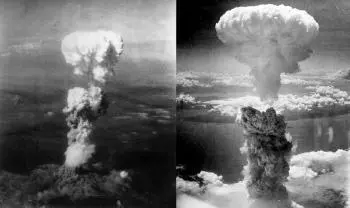
The bombing of Hiroshima and Nagasaki is a dark and tragic chapter in human history. This is the first and only time in history that the atomic bomb has been used for military purposes.
These two events, which took place in August 1945 at the end of World War II, marked the beginning of a new era in which humanity faced the devastation and destructive power of nuclear weapons.
Historic context
Towards the end of World War II, the United States and Japan were in a prolonged and devastating conflict. In an attempt to end the war, the US government made the controversial decision to use nuclear weapons against the Japanese cities of Hiroshima and Nagasaki.
On August 6, 1945, the American bomber Enola Gay dropped an atomic bomb on Hiroshima, followed by another on August 9 on Nagasaki. These bombings marked the first time in history that a nuclear bomb was used in a war.
The immediate impact of nuclear bombs
The effects of the explosions were catastrophic. Within seconds, cities were leveled by intense heat waves and massive explosions.
Thousands of people lost their lives instantly, and many others were seriously injured. An estimated 129,000 to 226,000 people died in both attacks, either instantly or from radiation-related injuries and illnesses in the months and years that followed.
Buildings and structures were reduced to rubble, and a massive fire spread rapidly. It is estimated that about 69% of the buildings in Hiroshima and about 44% in Nagasaki were destroyed.
The radiation released by the bombs also had a devastating impact on the health of the survivors, causing diseases and genetic mutations that persist to this day.
The long-term consequences
After the bombings, the cities of Hiroshima and Nagasaki faced enormous rebuilding and recovery challenges. The loss of human life was immense, with many people left homeless.
In addition, the aftermath of nuclear radiation brought with it a series of health problems, such as cancer, genetic diseases, and genetic disorders that affected later generations. These long-term effects are still being felt today.
The legacy and reflection after the bombing
The bombing of Hiroshima and Nagasaki left a deep impression on the global consciousness. It was a painful reminder of the terrible consequences of war and the destructive power of nuclear weapons.
The bombing ushered in the nuclear age and raised global awareness of the danger of nuclear weapons and the destructive potential of war. This spurred efforts to control nuclear proliferation and promote disarmament.
These efforts led to the establishment of international treaties to limit the use of nuclear weapons such as the Nuclear Non-Proliferation Treaty (NPT) or the Comprehensive Nuclear Test Ban Treaty (CTBT).
The causes: Why were Hiroshima and Nagasaki attacked?
There are several key reasons that led to the choice of these two cities as targets:
-
Military and Industrial Significance: Hiroshima and Nagasaki were key industrial and logistical centers for the Japanese war effort. Hiroshima was home to a major military base and was a manufacturing center for weapons, ammunition, and military equipment. Nagasaki, for its part, was an important port and industrial center with shipyards and factories that produced ships and war machinery.
-
Minimize Own Casualties: The decision to use nuclear weapons was made in part out of the belief that it would hasten Japan's surrender and prevent a ground invasion by US forces. A nuclear attack was expected to cause a massive and demoralizing impact, which could force Japan to surrender quickly and thus avoid a protracted and costly invasion.
-
Population concentration: Both Hiroshima and Nagasaki had a dense civilian population, which ensured that the effects of the bombs would be devastating and that there would be a high number of human casualties. The objective was to generate a psychological impact and demonstrate the destructive power of nuclear weapons.
-
Shortage of air defenses: After years of war, Japan was exhausted and its air defenses had been weakened. These cities were not considered priority targets for conventional bombing, meaning they had less protection against conventional bombing.